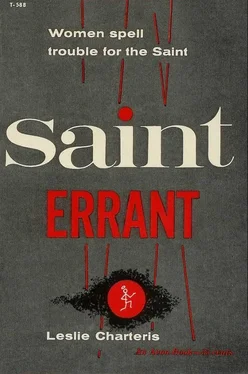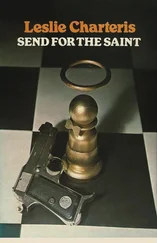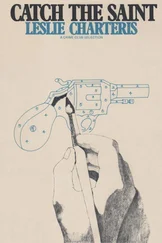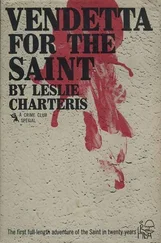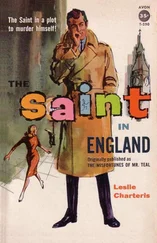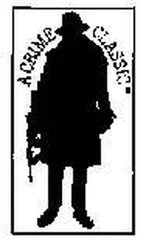Leslie Charteris - Saint Errant
Здесь есть возможность читать онлайн «Leslie Charteris - Saint Errant» весь текст электронной книги совершенно бесплатно (целиком полную версию без сокращений). В некоторых случаях можно слушать аудио, скачать через торрент в формате fb2 и присутствует краткое содержание. Год выпуска: 1954, ISBN: 1954, Издательство: Avon, Жанр: Крутой детектив, на английском языке. Описание произведения, (предисловие) а так же отзывы посетителей доступны на портале библиотеки ЛибКат.
- Название:Saint Errant
- Автор:
- Издательство:Avon
- Жанр:
- Год:1954
- ISBN:978-1477842874
- Рейтинг книги:3 / 5. Голосов: 1
-
Избранное:Добавить в избранное
- Отзывы:
-
Ваша оценка:
- 60
- 1
- 2
- 3
- 4
- 5
Saint Errant: краткое содержание, описание и аннотация
Предлагаем к чтению аннотацию, описание, краткое содержание или предисловие (зависит от того, что написал сам автор книги «Saint Errant»). Если вы не нашли необходимую информацию о книге — напишите в комментариях, мы постараемся отыскать её.
Saint Errant — читать онлайн бесплатно полную книгу (весь текст) целиком
Ниже представлен текст книги, разбитый по страницам. Система сохранения места последней прочитанной страницы, позволяет с удобством читать онлайн бесплатно книгу «Saint Errant», без необходимости каждый раз заново искать на чём Вы остановились. Поставьте закладку, и сможете в любой момент перейти на страницу, на которой закончили чтение.
Интервал:
Закладка:
Larry Phelan was a little shorter than the Coit Tower and much more interesting to know. He had the face of a college sophomore and the mind of the top-drawer mining engineer that he was.
“My mother,” he explained gloomily, over écrevisses au vin blanc , “is in the situation of any elderly lady with an excess of both time and money. Especially money.”
“A rather pleasant situation,” commented the Saint, chewing. “Is there such a thing as too much money?”
“Some people seem to think so,” said Phelan. “Did you ever hear of a guy called Melville Rochborne?”
Simon shook his head.
“It sounds like the sort of phony name that I wouldn’t buy any gold mines from.”
“He sold Mother a gold mine,” Phelan said.
“Any gold in it?”
“I defy anyone to find any gold in this particular mine,” said Phelan sadly. “It’s the old Lucky Nugget. Opened up with a big whoop-de-do in 1906, beautiful vein of quartz, eighteen dollars to the ton; closed in 1907—no more quartz. No one’s made a nickel on it since — even the tailings are worked out. The stock, which is what Mother bought, wouldn’t even serve for wrapping fish.”
“There are laws,” suggested the Saint, “which take care of folks who misrepresent stocks and bonds to other people.”
“That’s the trouble,” said Phelan. “This Rochborne is an extremely smart operator. There’s nothing on record — including Mother’s own testimony — to prove he ever claimed there was any gold in the mine.”
“Didn’t she ask you about it?”
“What would you think? After all,” said Phelan bitterly, “I have only two degrees in engineering and one in mining. Why should anyone, even my own dear mother, consult me on such a topic? Obviously, a crystal ball and a turban put my credentials in the shade. I’ll admit,” he added, in less vehement tones, “I’ve been up to my ears in some very hush-hush stuff lately — uranium sources, if you must know. Top secret.”
“Keep your uranium,” said the Saint. “I don’t like the things they do with it. What is this stuff about crystal balls?”
“My blessed mother,” Phelan said reverently, “has developed an interest in the Occult. In this specific case, a soothsayer from the Mystic East.”
“Tea leaves, eh?” said the Saint. “Lucky numbers and cards and so forth?”
“And signs of the zodiac,” supplemented Phelan. “A swami, no less. The Swami Yogadevi.”
“Sounds like a new cocktail. Where does he come in?”
“The swami,” said Phelan sourly, “is the guy who advised Mom to buy the wretched stock. She’s sort of gotten into a habit of consulting him, I’m afraid. I suppose he makes a couple of passes at his crystal and evokes a genie, or something. Seems to lay Mother and several dozen other respectable old-ladies-about-town in the aisles, anyway.”
Simon cleaned up his plate and lighted a cigarette.
“One gathers, Larry, that Mama has been hornswoggled by a couple of pretty smooth operators. I almost think it’s a new combination.”
“Combination?”
“Of course. It must be. Don’t you see how it works? Your swami spots the suckers who have plenty of moola, and gets their confidence with his mumbo-jumbo. Which isn’t illegal if he doesn’t claim to predict futures. Your Mr Rochborne peddles stocks and makes no claim for them. You can’t prosecute a man for that. Separately, they mightn’t get too far. Working together, they’re terrific... How much,” asked the Saint gently, “did your mother pay for the Lucky Nugget mine?”
“Forty-five thousand smackers,” Phelan admitted glumly.
The Saint whistled. He proceeded to order coffee and then sank into a lethargy which might or might not have denoted deep thought.
“What are you looking stupid about?” inquired Larry Phelan after five minutes.
“About the vacation I was going to have until you tripped into my life,” said Simon wryly. “However,” he added thoughtfully, “if Comrade Rochborne has forty-five G’s of Mama’s, he might have several of someone else’s Gs, too. Do you know anything else about him?”
“He has an address — an insurance office — where he picks up his mail. The people there know nothing about him. On a hunch I checked the city business-license records. It seems he was licensed as an assayer from 1930 to 1939. That fits into your picture.”
“I’ll keep thinking about it,” said the Saint.
He did exactly that, although for two days there was nothing to show for his thinking. But to the Saint a hiatus like that meant nothing. He knew better than anyone that those coups of his which seemed most spontaneous and effortless were usually the ones into which the hardest work had gone; that the machinery of his best buccaneering raids was labored and polished as devotedly as any master playwright’s plot structure. Even then there had to be an initial spark of inspiration to start the wheels turning, and in this instance the requisite spark eluded him tantalizingly for a full forty-eight hours.
When it came, it was nothing that he had even vaguely expected. It took the form of a chunky oblong package, crudely wrapped, which a bellboy delivered to his room. Simon scanned the label and found a postmark, and had a rather saddening premonition.
There was a note enclosed, printed in sprawling capitals on a sheet of blue-lined note paper.
Dere Mr. Templar,
Ole Jimmy Mc Dill Had One To Meny Double Wiskeys An Cash In His Chips Las Nite His Last Rekest Was Send You Ths Here Dingus Account Of You Are A Reel Good Feller An He Like You A Lot Same Is Inclose.
Yrs Truly
The Boys
Bonanza City
The Saint lifted the glass in his right hand.
“Jimmy McDill,” he said softly, “may there be double bourbons and unlimited credit wherever you are.”
He was happily playing with the contraption when Larry Phelan arrived to pick him up for dinner that night, and the engineer gazed at him in somewhat condescending puzzlement.
“What the hell are you doing with a Doodlebug, Saint?” he demanded, and Simon was hardly less surprised.
“How the hell did you know what it was?”
“The lunatic fringes of the business were stiff with these things during the Depression. I’ve seen ’em in all sizes and shapes. Trouble is, none of ’em are worth anything.”
“What do you mean, not worth anything?” Simon objected. “I’ll bet I can pick up a silver dollar at ten feet with this gadget.”
“I’ll bet you can too,” Phelan said. “I’ve seen it done, and by queerer-looking numbers than this one. I’ve seen ’em with loop aerials, knee action, and floating power.”
Simon produced a silver cartwheel and threw it on the carpet. Grasping the stirrup handles, he lifted the box, and the same humming sound he had heard in the Bonanza City bar filled the room.
“Listen to the hum,” he said.
“They all hum,” said Larry Phelan.
Simon made sure the scale pointer indicated “Silver,” and advanced upon the dollar. Just as it had done for James Aloysius McDill, the humming keened up the scale until, as the Saint stood over the dollar, a malignant whining came from between his hands. He turned to Phelan triumphantly.
“This one works,” he said.
“Sure,” rejoined Phelan. “Now let’s see how well it works.”
He picked up a San Francisco telephone directory and the classified directory and piled them on top of the dollar, and the humming stopped abruptly.
“They’re all the same,” Phelan said sympathetically. “It seems to be possible to bounce some kind of oscillation off different metals, and make it selective according to their atomic structure, but the beam hardly has any penetration. Your lode would have to be practically on the surface, where you could see it anyhow, before a thing like this would detect it at all. I hope you didn’t pay much for it.”
Читать дальшеИнтервал:
Закладка:
Похожие книги на «Saint Errant»
Представляем Вашему вниманию похожие книги на «Saint Errant» списком для выбора. Мы отобрали схожую по названию и смыслу литературу в надежде предоставить читателям больше вариантов отыскать новые, интересные, ещё непрочитанные произведения.
Обсуждение, отзывы о книге «Saint Errant» и просто собственные мнения читателей. Оставьте ваши комментарии, напишите, что Вы думаете о произведении, его смысле или главных героях. Укажите что конкретно понравилось, а что нет, и почему Вы так считаете.
